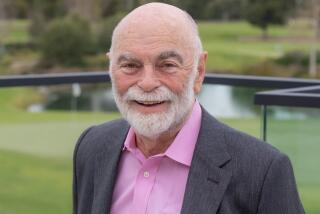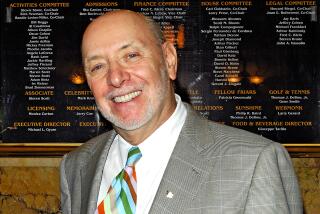William Morris: Is the Movie Luster Slowly Fading?
The William Morris Agency had plenty to celebrate at its twin 90th anniversary parties in Los Angeles and New York last month. Healthy profits. A booming TV division. A roster of literary clients that includes an ex-President and top government officials as well as some of the biggest names in books.
But when it comes to its stature in the movie community, there wasn’t much cause to break out champagne: One year after the oldest and largest agency in the talent business lured superagent Sue Mengers out of retirement to invigorate its weakened movie department, William Morris continues to lose important stars.
The most recent emigre was Kevin Costner, who transferred his allegiance to the Creative Artists Agency this spring, just as his widely acclaimed baseball fantasy film, “Field of Dreams,” was about to hit the nation’s theaters. Costner, who also starred in last summer’s hit movie, “Bull Durham,” was lured away by CAA president Michael Ovitz shortly after his former agent, J.J. Harris, decided she would leave William Morris to join a start-up competitor, InterTalent, according to sources close to the actor.
Several months earlier, William Morris had lost Steve Guttenberg, star of the “Police Academy” sequels as well as the 1987 blockbuster “Three Men and a Baby.” Guttenberg also went to CAA. Other departures in the past year include Anne Archer, Patrick Dempsey, Denzel Washington, Danny Glover, Eric Roberts and Howie Mandel.
While actors invariably have personal reasons for switching agencies, industry sources close to some of these stars say that William Morris has lost much of its aura of power, a key ingredient in convincing actors that the agency can deliver the big money and attractive parts they want. “They’re not out there, being aggressive,” said a representative of one of the stars who recently left. It’s not surprising, some say, that the enterprising CAA has been the most frequent destination for stars leaving William Morris over the past several years.
Both Mengers and the top management of William Morris, including president Norman Brokaw, refused to be interviewed for this story, despite repeated requests. But one source close to William Morris said that its management is pleased with Mengers, and noted that she is on target with the agency’s internal plans.
William Morris continues to represent such film stars as Clint Eastwood, Tom Hanks, Jack Lemmon, Walter Matthau and Shelley Long, and directors such as Peter Weir (“Witness”). Moreover, the agency is building a strong portfolio of up-and-coming young stars such as Ralph Macchio, Tim Robbins, Uma Thurman and Julia Roberts.
But, observers say, Mengers has yet to prove that she can augment that list by wooing back the kind of major talent that once made her one of Hollywood’s most important agents. At the height of her influence at Creative Management Agency (a predecessor to International Creative Management), Mengers represented such stars as Barbra Streisand, Burt Reynolds, Gene Hackman and Cher, among many, many others. She retired in 1986, but returned to work in April, 1988, after being recruited by William Morris.
Critics of the agency’s movie business acknowledge that turning around William Morris’ movie department is a herculean task, even for someone with Mengers’ experience and alliances. As one Hollywood veteran who has known Mengers for years described her problem: “You have to stop the snowball from running downhill, and then push it up again.”
The agency’s movie division suffered a major blow in 1986, when its star agent, Stan Kamen, died. Considered one of Hollywood’s preeminent agents, Kamen had represented clients such as Goldie Hawn and Chevy Chase. In the 1970s and into the 1980s, Kamen at William Morris and Mengers at Creative Management Agency reigned supreme in Hollywood. When Kamen died, many of his most important clients left William Morris.
Two years later, Ed Limato, the William Morris agent considered second only to Kamen in effectiveness, defected to CAA. Limato clients Michelle Pfeiffer, Richard Gere, Mel Gibson and Nicolas Cage followed.
Since coming out of retirement to fill Kamen’s spot at William Morris as senior vice president, worldwide head of the motion picture and literary division, Mengers has tried to lure back some of her old clients, according to industry sources. But she faces stiff competition from two entrenched powers--ICM and CAA, which was started 14 years ago by five defectors from William Morris--as well as small but strong rivals such as InterTalent and Leading Artists Agency. Among the biggest names William Morris has signed in the past year are film actors Peter Strauss, Christopher Walken and Treat Williams.
Apparently the agency’s management continues to search for top executives with strong ties to the film community. According to industry sources, a William Morris executive informally approached producer-manager Bernie Brillstein two months ago about his interest in accepting an unspecified “leadership” position in the agency. Brillstein, according to these sources, turned down the offer. Brillstein declined to comment.
The defections of stars from its movie division doesn’t mean much to William Morris’ bottom line. The privately held agency, which has more than 500 employees worldwide, remains very profitable: Last year, its Class C stock rose in value $2.4 million, or nearly 14%, to more than $20 million. In addition, the agency owns prime real estate in the center of Beverly Hills, as well as shopping malls and apartment buildings elsewhere.
Much of William Morris’ profitability can be traced to its TV division, where the agency’s involvement in packaging the hit series “The Cosby Show” ensures William Morris a portion of that show’s record $600-million syndication fees as well as a percentage of its network license fee. (Although the details of William Morris’ agreement are secret, agencies typically receive a 10% commission for packaging services. In return, William Morris forgoes less lucrative commissions from its clients, such as Cosby, who appear in the show.) Also on the agency’s TV client list are stars Roseanne Barr and Angela Lansbury.
The agency’s literary department represents authors such as Tom Clancy, James M. Michener, Gore Vidal, Dominick Dunne, Robin Cook and Susan Isaacs. And Brokaw, who was elected president and chief executive officer in February after the death of former agency chief Lee Stevens, has created a whole new line of business: The “celebrity” politician. In recent years, he has signed up clients ranging from former President Gerald Ford to, most recently, outgoing U.S. Surgeon General Dr. C. Everett Koop.
In the intensely competitive movie business, the fortunes of individual talent agencies rise and fall like ocean tides. William Morris may not be at the zenith of its Hollywood power right now, but, as its allies note, the agency has survived as an important part of the business longer than any competitor.
“In 90 years, William Morris has always been there,” said Lee Solters, the agency’s publicist. “Every now and then a new kid appears on the block. But no one has yet been able to topple William Morris from its pedestal.”
More to Read
The biggest entertainment stories
Get our big stories about Hollywood, film, television, music, arts, culture and more right in your inbox as soon as they publish.
You may occasionally receive promotional content from the Los Angeles Times.










